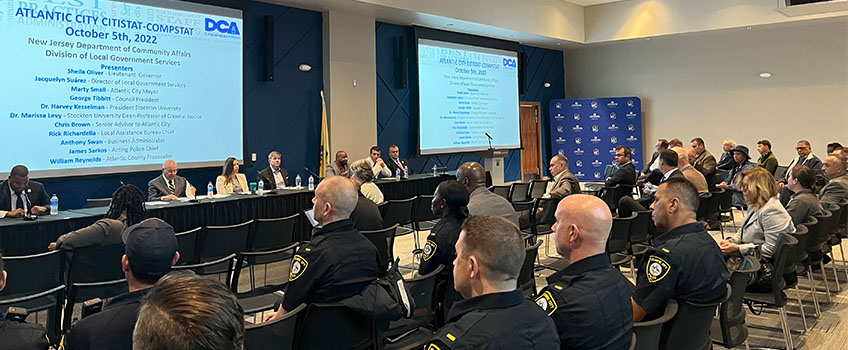Dean Collaborates with Police to Adapt Data Crime System

Stockton University President Harvey Kesselman and Marissa Levy, the dean of the School of Social and Behavioral Sciences join several state and city authorities in the Fannie Lou Hamer Room at Stockton Atlantic City for a symposium on the CitiState and CompStat programs.
Atlantic City, N.J. – “Crime is not just a police problem, crime is everyone’s problem.”
Those words by Atlantic City acting Police Chief James Sarkos are at the core of a new partnership announced Wednesday to help improve the safety of Atlantic City residents.
Stockton University is collaborating with the New Jersey Department of Community Affairs, the city of Atlantic City and the Atlantic City Police Department to introduce two new data-driven programs to the city called CitiStat and CompStat.
Both programs rely heavily on community involvement and public engagement to hold the city government and the police department accountable in efforts to improve quality of life.
“We believe that CitiStat and CompStat can be transformative tools for Atlantic City,” said Robert Long, the deputy commissioner of the state Department of Community Affairs. “We think the city can use the two programs to effectively examine qualify of life issues that affect our neighborhoods. And in the process make Atlantic City a better place to live, buy a home, raise children, establish a business or take a vacation.”
CitiStat was first used in Baltimore two decades ago. It enables municipal government to track, analyze, appraise and improve municipal services. It also allows residents to meet regularly with city offices to discuss potential problems in those services.
CompStat, short for Computer Statistics, was pioneered over 20 years ago by the New York City Police Department. Its goal is to hold police department managers accountable for their performance by utilizing computer systems to analyze large sets of data. The analyses will help determine where to deploy police officers in the hope of reducing crime.
“The CompStat process is all about accountability. That’s from the officer on the street, all the way through the chain of command and then finally to the chief, who is accountable to the citizens for making change in the community,” said Marissa Levy, the dean of Stockton’s School of Social and Behavioral Sciences. She worked with the NYPD on CompStat in the late 1990s and early 2000s, and she has been working for several months to adapt the system to the Atlantic City Police Department.
“Marissa Levy’s commitment to these important civic issues illustrates the importance and value of the bonds between academic, government and law enforcement entities,” said Stockton President Harvey Kesselman. “There is no city that has ever gone through a renaissance that didn’t have those partners working together. We’re doing that here.”
Levy said the use of CompStat in New York City was credited with reducing crime by 50% to 60%, due mostly to increased accountability.
“We are hoping the model that Chief Sarkos has deployed will continue to evolve,” Levy said. “It highlights the strengths of Atlantic City and continues to show best practices and share those with others around the city to bring about change.”
Combining CompStat with the CitiStat program allows the community to be more a part of the solution, Levy said.
“CompStat alone doesn’t have the interactive process with the community, but CitiStat does,” she said. “It allows both parties to hear the concerns of the citizens and be accountable to address them.”
The full unveiling of both programs will be presented Nov. 16 in the Fannie Lou Hamer Room at Stockton’s Atlantic City campus. Meetings will be held bi-monthly at Stockton with the portion focused on CitiStat open to the public.
Jacquelyn Suarez, the director of the state Division of Local Government Services, hopes these two new initiatives will encourage residents of Atlantic City to speak out about problems and concerns in the city.
“You’ll be an integral part of this effort,” she said. “I look forward to the efficacy of the CompStat and CitiStat programs and how it will propel Atlantic City into continued success once it’s fully in effect.”
And Kesselman reiterated that this is another example of how the city’s future is bright.
“Today’s symposium is an awesome example of the positive and forward-thinking initiatives that will continue to advance an already outstanding city,” he said. “Rest assured Stockton will remain a valued partner in support of these essential city endeavors.”
— Story by Mark Melhorn, photo by Stacey Clapp


